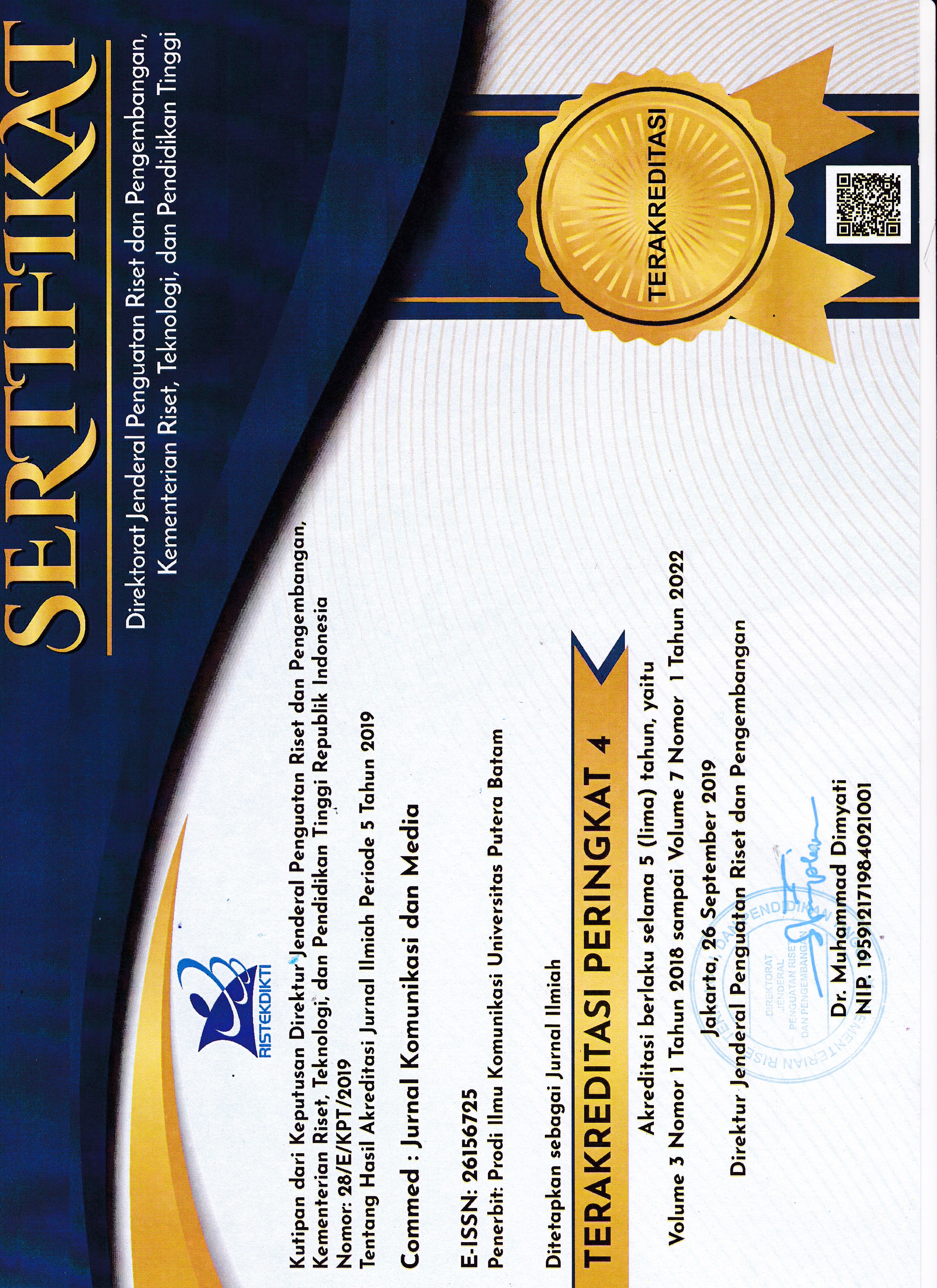STRATEGI KAMPANYE POLITIK KANDIDAT PETAHANA DI DAERAH RENTAN KALAH
Keywords:
Campaign; Political Communication; IncumbentAbstract
This study discusses a new phenomenon in politics in Garut Regency. Rudy Gunawan and Helmi Budiman (RGHB) became the first incumbent candidates who were successfully re-elected in the second period of regional elections in Garut in 2018. This research is about how candidates and teams in the campaign to win again in areas prone to losing for incumbent candidates. The purpose of this study is to provide an overview, evaluative structure and teamwork in winning the RGHB in the second period. This study uses a qualitative approach. Data was collected through qualitative observations, interviews, and qualitative document collection. The results of this study are incumbent candidates are able to carry out communicator selection strategies, messages supported by the media to strengthen support from old voters Rudy-Helmi during the Regional Head Election in 2013, and change the orientation of choosing from new voters. This research can be used as a concept of political campaign strategy and the winning of political candidates in the future as well as consideration in formulating the incumbent candidate's campaign strategy.
Keywords: Campaign; Political Communication; Incumbent
References
Ahmed, S., Jaidka, K., & Cho, J. (2016). The 2014 Indian elections on Twitter: A comparison of campaign strategies of political parties. Telematics and Informatics, 33(4), 1071–1087. https://doi.org/10.1016/j.tele.2016.03.002
Aunphattanasilp, C. (2019). Civil society coalitions, power relations, and socio-political ideas: Discourse creation and redesigning energy policies and actor networks in Thailand. Energy Research and Social Science, 58(January), 101271. https://doi.org/10.1016/j.erss.2019.101271
Bevan, S., & Krewel, M. (2015). Responsive elections: The effect of public opinion on political campaigns. Electoral Studies, 40, 548–555. https://doi.org/10.1016/j.electstud.2015.07.006
Bincof, M. (2018). The Role of Youth in Political Participation in Somalia. Journal Of Humanities And Social Science, 23(10), 64–74. https://doi.org/10.9790/0837-2310026474
Cahan, D. (2019). Electoral cycles in government employment: Evidence from US gubernatorial elections. European Economic Review, 111, 122–138. https://doi.org/10.1016/j.euroecorev.2018.09.007
Djuyandi, Y. (2017). Komunikasi Politik Tim Pemenangan Hendra Hemeto Dalam Pemilihan Ketua Dpd Ii Partai Golkar Kabupaten Gorontalo Periode 2016–2021. Jurnal Wacana Politik, 2(1), 10–21. https://doi.org/10.24198/jwp.v2i1.11322
Hajad, V. (2018). MEDIA DAN POLITIK (Mencari Independensi Media Dalam Pemberitaan Politik). SOURCE : Jurnal Ilmu Komunikasi, 2(2), 1–10. https://doi.org/10.35308/source.v2i2.295
Handoko, M. R., & Stellarosa, Y. (2020). The Influence of President Joko Widodo’s Instagram Content on Beginner Voters Participation in the 2019 General Elections. Mediator: Jurnal Komunikasi, 13(1), 24–38. https://doi.org/10.29313/mediator.v13i1.5161
Kammermann, L., & Dermont, C. (2018). How beliefs of the political elite and citizens on climate change influence support for Swiss energy transition policy. Energy Research and Social Science, 43(May), 48–60. https://doi.org/10.1016/j.erss.2018.05.010
Kang, W. C., Park, W. ho, & Song, B. K. (2018). The effect of incumbency in national and local elections: Evidence from South Korea. Electoral Studies, 56, 47–60. https://doi.org/10.1016/j.electstud.2018.09.005
Liu, Y., Ye, C., Sun, J., Jiang, Y., & Wang, H. (2020). Modeling undecided voters to forecast elections : From bandwagon behavior and the spiral of silence perspective. International Journal of Forecasting, xxxx. https://doi.org/10.1016/j.ijforecast.2020.06.011
Mujianto, H., Nurhadi, Z. F., & Kharismawati, K. (2021). Instagram Sebagai Media Pembentuk Personal Branding. Commed : Jurnal Komunikasi Dan Media, 5(2), 154–169. https://doi.org/10.33884/commed.v5i2.3138
Nurussa’adah, E., & Sumartias, S. (2017). Komunikasi Politik Partai Keadilan Sejahtera (Pks) Dalam Keterbukaan Ideologi. Jurnal Kajian Komunikasi, 5(1), 43. https://doi.org/10.24198/jkk.v5i1.8522
Pressgrove, G., & Kim, C. (2018). Stewardship, Credibility and Political Communications: A Content Analysis of the 2016 Election. Public Relations Review, 44(2), 247–255. https://doi.org/10.1016/j.pubrev.2018.01.003
Rumayya, Rammohan, A., Purwono, R., & Harymawan, I. (2020). The local economy and Re-election of incumbent district leaders in Indonesia. Heliyon, 6(5), e04098. https://doi.org/10.1016/j.heliyon.2020.e04098
Vergeer, M., Tkach-Kawasaki, L., & Lee, J. (2020). Individual and contextual determinants of adoption of online media services in the 2017 lower house election campaign in Japan. Telematics and Informatics, 50(March), 101399. https://doi.org/10.1016/j.tele.2020.101399
Wei, J. M. (2020). Naming candidates as preemptive discursive practice: The 2016 Taiwan presidential race. Journal of Pragmatics, 166, 84–96. https://doi.org/10.1016/j.pragma.2020.05.012
Zollo, L., Filieri, R., Rialti, R., & Yoon, S. (2020). Unpacking the relationship between social media marketing and brand equity: The mediating role of consumers’ benefits and experience. Journal of Business Research, 117(May), 256–267. https://doi.org/10.1016/j.jbusres.2020.05.001
Buku :
Arifin, Anwar. (2011). Komunikasi Politik. Yogyakarta: GrahaIlmu.
Littlejohn. Stephen. W. (2009). Teori Komunikasi. Jakarta: Salemba Humanika
Rakhmat. J, (1994). Psikologi Komunikasi, Bandung: Remaja Rosdakarya
Venus, Antar. (2018). Manajemen Kampanye. Bandung: PT. Remaja Rosdakarya

















